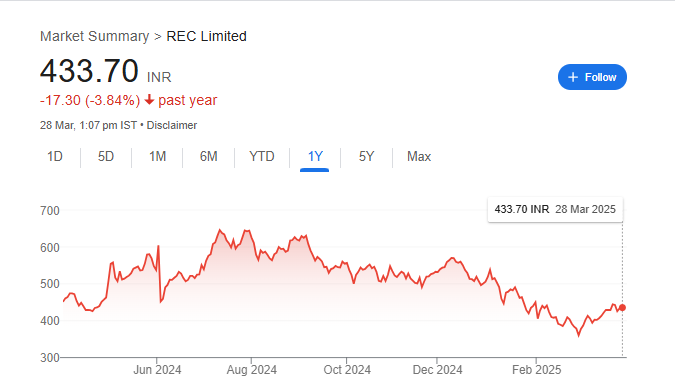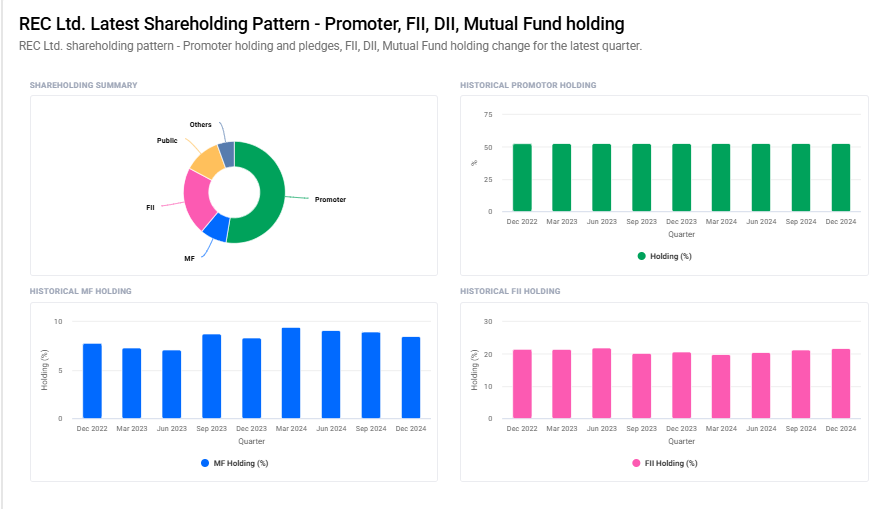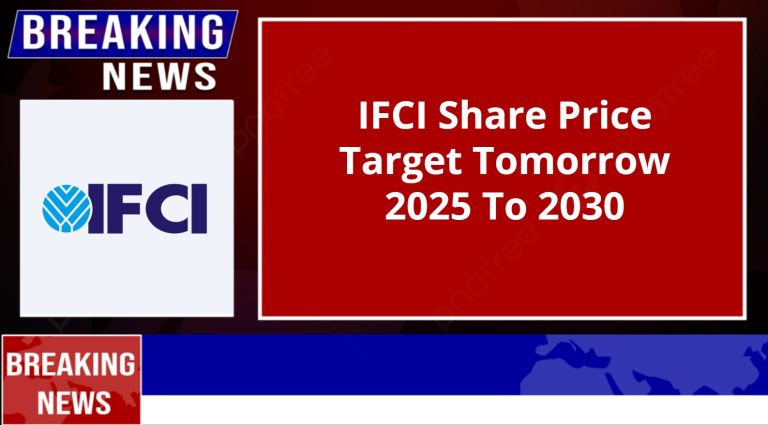REC Share Price Target Tomorrow 2025 To 2030
REC Limited is a government-backed financial institution that provides loans for power sector projects, including transmission, distribution, and renewable energy. The company plays a key role in India’s energy infrastructure development. Its share price is influenced by factors like loan growth, interest rates, government policies, and the overall performance of the power sector. REC Share Price on NSE as of 28 March 2025 is 433.70 INR.
Current Market overview of REC Share Price
- Open: 433.90
- High: 440.00
- Low: 433.00
- Previous Close: 433.40
- Volume: 2,903,452
- Value (Lacs): 12,608.24
- VWAP: 436.82
- Mkt Cap (Rs. Cr.): 114,347
- Face Value: 10
- UC Limit: 476.70
- LC Limit: 390.10
- 52 Week High: 654.00
- 52 Week Low: 357.35
REC Share Price Target Tomorrow 2025 To 2030
| REC Share Price Target Years | REC Share Price |
| 2025 | INR 660 |
| 2026 | INR 700 |
| 2027 | INR 740 |
| 2028 | INR 780 |
| 2029 | INR 820 |
| 2030 | INR 860 |
REC Share Price Chart

REC Shareholding Pattern
- Promoter: 52.6%
- FII: 21.7%
- DII: 14%
- Public: 11.7%

Key Factors Affecting REC Share Price Growth
-
Government Policies and Reforms
REC (Rural Electrification Corporation) is a government-backed company, so policies related to power sector reforms, rural electrification, and renewable energy financing have a direct impact on its growth. Supportive policies can boost demand for its services and improve investor confidence. -
Loan Growth and Disbursements
As a major lender in the power sector, REC’s share price depends on the growth of its loan book. Higher loan disbursements, especially in renewable energy and infrastructure projects, can drive revenue and support stock growth. -
Interest Rate Trends
Since REC primarily operates as a financial institution, changes in interest rates affect its borrowing costs and profitability. Lower interest rates can improve margins, making the stock more attractive to investors. -
Asset Quality and NPAs
Non-performing assets (NPAs) are a key concern for any lender. If REC manages to control bad loans and recover dues effectively, it strengthens investor confidence and boosts share price growth. High NPAs, on the other hand, can negatively impact stock performance. -
Government and PSU Investments
Since REC is a public sector undertaking (PSU), government investments and budget allocations for power infrastructure can significantly impact its future earnings. Increased investment in the power sector leads to greater opportunities for REC. -
Renewable Energy Expansion
The company’s focus on funding renewable energy projects, such as solar and wind power, can drive long-term growth. As India moves towards clean energy, REC’s role in financing these projects will be a major factor influencing its share price. -
Overall Market and Economic Conditions
Broader economic trends, stock market performance, and investor sentiment also affect REC’s share price. A strong economy leads to higher infrastructure investments, while economic slowdowns or market volatility can impact growth expectations.
Risks and Challenges for REC Share Price
-
High Exposure to the Power Sector
REC primarily lends to power companies, making it highly dependent on the sector’s performance. Any slowdown in power demand, delays in projects, or policy changes can directly impact its financial health and share price. -
Rising Non-Performing Assets (NPAs)
Since REC provides loans to power projects, it faces the risk of defaults. If borrowers fail to repay, it increases bad loans (NPAs), hurting profitability and investor confidence. High NPAs can also lead to stricter regulatory scrutiny. -
Fluctuating Interest Rates
As a financial institution, REC borrows funds to lend to power companies. If interest rates rise, borrowing costs increase, reducing profit margins. This can negatively impact earnings and slow down stock growth. -
Government Policy and Regulatory Risks
Being a government-backed entity, REC’s business is influenced by policy changes. If the government alters its approach to rural electrification or renewable energy funding, it may reduce loan disbursement opportunities, affecting revenue. -
Competition from Private Lenders
Private banks and financial institutions are expanding their presence in infrastructure financing. Increased competition may put pressure on REC’s loan pricing and profitability, impacting its long-term growth prospects. -
Economic Slowdowns and Market Volatility
During economic downturns, infrastructure investments slow down, reducing demand for REC’s loans. Additionally, global and domestic market volatility can lead to stock price fluctuations, making REC shares vulnerable to external economic conditions. -
Dependency on Government Support
While government backing provides stability, it also limits operational flexibility. If the government reduces budget allocations for the power sector or restructures its policies, REC’s growth plans could face challenges, impacting its share price performance.
Read Also:- Wipro Share Price Target Tomorrow 2025 To 2030







